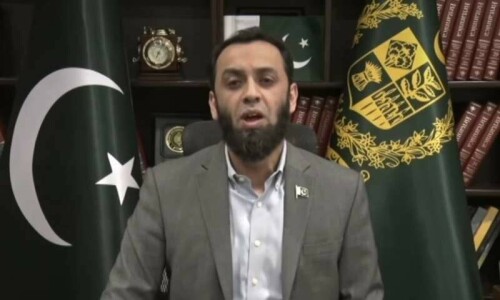A petition was submitted in the Lahore High Court (LHC) on Tuesday for the First Information Reports (FIR) against Jamaatud Dawa (JuD) chief Hafiz Muhammad Saeed and 65 others to be quashed.
The high court is set to hear the petition submitted by a top JuD leader, Malik Zafar Iqbal, on August 22 (Thursday). The federal government, Punjab government and the regional headquarter of the Counter Terrorism Department (CTD) have been made party in the petition.
According to the petition submitted by Iqbal, who is also named in the police reports, the FIRs registered were "without lawful authority and of no legal effect".
The petition stated that the property under question was for a mosque and was being used for this purpose. Therefore, the 23 FIRs listed were "without lawful authority".
It added that the property "is not and has not ever (sic) been used for terror financing as there is no tangible evidence on record to support such bold (sic) allegations".
According to the petition, one of the aggrieved persons (Iqbal) in the FIRs had filed the petition while the others were pro forma respondents.
The petition said that the FIRs describing the petitioner as the head of the proscribed militant group Lashkar-e-Taiba (LeT) were "factually and legally incorrect".
It asked that the court declare that none of the petitioners and pro-forma respondents are linked with LeT and therefore, FIRS were without "lawful authority and of no legal effect".
On July 3, top 13 leaders of the banned JuD, including Saeed and Naib Emir Abdul Rehman Makki, were booked in nearly two dozen cases for terror financing and money laundering under the Anti-Terrorism Act, 1997.
Besides the top two JuD leaders, Iqbal, Ameer Hamza, Mohammad Yahya Aziz, Mohammad Naeem, Mohsin Bilal, Abdul Raqeeb, Dr Ahmad Daud, Dr Muhammad Ayub, Abdullah Ubaid, Mohammad Ali and Abdul Ghaffar were also booked in the cases.
The CTD, which registered the cases in five cities of Punjab, declared that the JuD was financing terrorism from the massive funds collected through non-profit organisations and trusts including Al-Anfaal Trust, Dawatul Irshad Trust, Muaz Bin Jabal Trust, etc.
These non-profit organisations were banned in April as the CTD during detailed investigations found that they had links with the JuD and its top leadership, accused of financing terrorism by building huge assets/properties from the collected funds in Pakistan.
On July 17, Saeed was arrested in connection with a terrorism financing case while on his way from Lahore to Gujranwala.















































